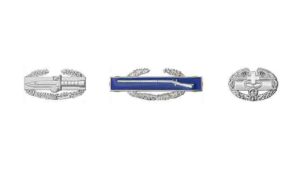Medal of Honor Recipients of the 82nd Airborne Division
The 82nd Airborne Division has a long and honorable history of service as a premier division of the United States Army. A huge part of that history is, as one would expect, comprised of the blood, sweat, tears, and valiant efforts of the soldiers who have served as part of it. Among them are six recipients of the highest individual decoration that a United States soldier can receive – the Medal of Honor.
The Medal of Honor is the most-prestigious personal military decoration in the land and is only awarded to United States military service members who have distinguished themselves by acts of valor. The 6 legendary heroes that will be discussed did just that.
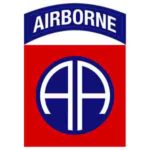 Currently, the 82nd Airborne Division is an airborne infantry division specializing in parachute assault operations into denied areas. It is well known for its ability to “respond to crisis contingencies anywhere in the world within 18 hours”. The unit is based at Fort Bragg, NC. This is “now” but, once upon a time, the 82nd was known simply as the 82nd Division. There was no airborne and the division was not based at Fort Bragg, it was based at Fort Gordon (then Camp Gordon), GA.
Currently, the 82nd Airborne Division is an airborne infantry division specializing in parachute assault operations into denied areas. It is well known for its ability to “respond to crisis contingencies anywhere in the world within 18 hours”. The unit is based at Fort Bragg, NC. This is “now” but, once upon a time, the 82nd was known simply as the 82nd Division. There was no airborne and the division was not based at Fort Bragg, it was based at Fort Gordon (then Camp Gordon), GA.
This was when unit got its nickname “All-American” having been constituted of soldiers from all of the then 48 states. That was the basis for the famous “AA” that we see on the 82nd Airborne Division shoulder patch.


The 6 awards of the Medal of Honor to soldiers serving in the now 82nd Airborne resulted from actions in three different wars; World War I, World War II, and the Vietnam War. The names and ranks of the recipients are as follows;
- Emory J Pike (Lieutenant Colonel)
- Alvin C York (Corporal)
- John R Towle (Private)
- Charles N Deglopper (Private First Class)
- Leonard A Funk Jr (First Sergeant)
- Felix M Conde-Falcon (Staff Sergeant)
Recipient Profiles
World War I – 82nd Division Medal of Honor Recipient
Two awards of the Medal of Honor were made to members of the 82nd Airborne Division during World War I.
Lieutenant Colonel Emory J Pike
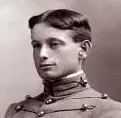 Lieutenant Colonel Emory Jenison Pike was born on December 18, 1876. He graduated from the United States Military Academy at West Point in 1901. Of note, Pike was the only West Point graduate to be awarded the Medal of Honor during World War I. He received the nations highest honor as a result of his actions at Vandieres, France on September 15, 1918 making him the first member of the 82nd Airborne Division to receive the honor.
Lieutenant Colonel Emory Jenison Pike was born on December 18, 1876. He graduated from the United States Military Academy at West Point in 1901. Of note, Pike was the only West Point graduate to be awarded the Medal of Honor during World War I. He received the nations highest honor as a result of his actions at Vandieres, France on September 15, 1918 making him the first member of the 82nd Airborne Division to receive the honor.
He later died of the injuries that he sustained in action. Subsequently, he was awarded the honor posthumously with the presentation of the medal being made to his daughter. His body was interred at Woodland Cemetery in Des Moines, Iowa.
Medal of Honor Citation for Lieutenant Colonel Emory J Pike
Having gone forward to reconnoiter new machine gun positions, Lt. Col. Pike offered his assistance in reorganizing advance infantry units which had become disorganized during a heavy artillery shelling. He succeeded in locating only about 20 men, but with these he advanced and when later joined by several infantry platoons rendered inestimable service in establishing outposts, encouraging all by his cheeriness, in spite of the extreme danger of the situation. When a shell had wounded one of the men in the outpost, Lt. Col. Pike immediately went to his aid and was severely wounded himself when another shell burst in the same place.
While waiting to be brought to the rear, Lt. Col. Pike continued in command, still retaining his jovial manner of encouragement, directing the reorganization until the position could be held. The entire operation was carried on under terrific bombardment, and the example of courage and devotion to duty, as set by Lt. Col. Pike, established the highest standard of morale and confidence to all under his charge. The wounds he received were the cause of his death.
Corporal Alvin C York
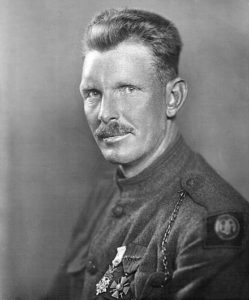 Alvin Cullum York was born on December 13, 1887. Most people who have heard of him probably heard him called Sergeant York although he was a Corporal during the time when he earned the Medal of Honor. He received the nation’s highest individual decoration for leading an attack on a German machine gun nest. It was reported that he took at least one machine gun, killed at least 25 enemy soldiers and captured 132 German soldiers.
Alvin Cullum York was born on December 13, 1887. Most people who have heard of him probably heard him called Sergeant York although he was a Corporal during the time when he earned the Medal of Honor. He received the nation’s highest individual decoration for leading an attack on a German machine gun nest. It was reported that he took at least one machine gun, killed at least 25 enemy soldiers and captured 132 German soldiers.
His actions occurred while with the 82nd Airborne during the United States led portion of the Meuse-Argonne Offensive in France. The goal of the offensive was to breach the Hindenburg line and force the Germans to surrender. York earned decorations from several allied countries during WWI, including France, Italy and Montenegro. In fact, Sergeant York was one of the most decorated United States Army soldiers of World War I.
Soon after his actions, York was promoted to sergeant and received the Distinguished Service Cross. A few months later, it was upgraded to the Medal of Honor. The Medal of Honor was presented by the commanding general of the American Expeditionary Forces, General John J. Pershing making York the second member of the 82nd Airborne Division to receive the nation’s highest honor. He passed away on September 2, 1964 at the age of 76.
Medal of Honor Citation for Corporal Alvin C York
After his platoon suffered heavy casualties and 3 other noncommissioned officers had become casualties, Cpl. York assumed command. Fearlessly leading seven men, he charged with great daring a machine gun nest which was pouring deadly and incessant fire upon his platoon. In this heroic feat the machine gun nest was taken, together with 4 officers and 128 men and several guns.
World War II – 82nd Airborne Medal of Honor Recipients
Four awards of the Medal of Honor were made to members of the 82nd Airborne Division during World War II.
Private John R Towle
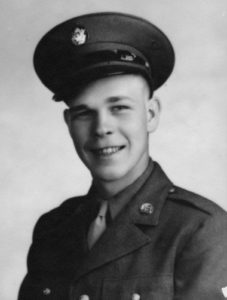 Private John Roderick Towle was born in Cleveland, Ohio on October 19, 1924. He joined the United States Army in March of 1943 (during World War II) and volunteered for the airborne infantry. After training, he was assigned to Charlie Company of the 1st Battalion of the 504th Parachute Infantry Regiment (504th PIR), becoming a member of the 82nd Airborne Division.
Private John Roderick Towle was born in Cleveland, Ohio on October 19, 1924. He joined the United States Army in March of 1943 (during World War II) and volunteered for the airborne infantry. After training, he was assigned to Charlie Company of the 1st Battalion of the 504th Parachute Infantry Regiment (504th PIR), becoming a member of the 82nd Airborne Division.
On September 21, 1944, Private Towle engaged a German force with his rocket launcher in an attempt to disable two enemy tanks and a half-track. In order to do so, he left his protected position and exposed himself to enemy fire sacrificing his life and saving many others. He was killed, in action, during the battle. Subsequently, he was posthumously awarded the Medal of Honor six months later, on March 15, 1945.
This made Private Towle the third member of the 82nd Airborne Division to receive the Medal of Honor. He was only 19 years old at the time of his death. His body was sent home and interred at the Calvary Cemetery in Cleveland, Ohio.
Medal of Honor Citation for Private John R Towle
For conspicuous gallantry and intrepidity at the risk of life above and beyond the call of duty on 21 September 1944, near Oosterhout, Holland. The rifle company in which Pvt. Towle served as rocket launcher gunner was occupying a defensive position in the west sector of the recently established Nijmegen bridgehead when a strong enemy force of approximately 100 infantry supported by 2 tanks and a half-track formed for a counterattack. With full knowledge of the disastrous consequences resulting not only to his company but to the entire bridgehead by an enemy breakthrough, Pvt. Towle immediately and without orders left his foxhole and moved 200 yards in the face of intense small-arms fire to a position on an exposed dike roadbed.
From this precarious position Pvt. Towle fired his rocket launcher at and hit both tanks to his immediate front. Armored skirting on both tanks prevented penetration by the projectiles, but both vehicles withdrew slightly damaged. Still under intense fire and fully exposed to the enemy, Pvt. Towle then engaged a nearby house which 9 Germans had entered and were using as a strongpoint and with 1 round killed all 9.
Hurriedly replenishing his supply of ammunition, Pvt. Towle, motivated only by his high conception of duty which called for the destruction of the enemy at any cost, then rushed approximately 125 yards through grazing enemy fire to an exposed position from which he could engage the enemy half-track with his rocket launcher. While in a kneeling position preparatory to firing on the enemy vehicle, Pvt. Towle was mortally wounded by a mortar shell. By his heroic tenacity, at the price of his life, Pvt. Towle saved the lives of many of his comrades and was directly instrumental in breaking up the enemy counterattack.
Charles N Deglopper
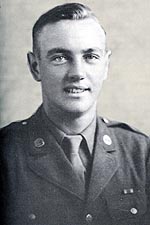
Charles Neilans DeGlopper was born on November 30, 1921 and was a Grand Island, New York native. He entered the United States Army in November 1942 and trained at Camp Croft, South Carolina. DeGlopper was deployed overseas in April 1943, where he served in North Africa, Sicily, Italy and France. In France, he was part of the 82nd Airborne Division 325th Glider Infantry Regiment participating in glider insertions into the country. DeGlopper is the only soldier from that regiment ever to receive the nations highest honor.
On June 9, 1944 in La Fière, Manche, Normandy, France, Private First Class DeGlopper took the actions the earned him the Medal of Honor. After being wounded by gunfire, he laid down the suppressive fire that served to enable his unit to maneuver as needed during the battle. Ultimately, he was killed in action on June 9, 1944. Subsequently, Private First Class Charles DeGlopper was posthumously awarded the Medal of Honor on February 28, 1946 making him the fourth member of the 82nd Airborne Division to receive the honor.
Medal of Honor Citation for Private First Class Charles N Deglopper
He was a member of Company C, 325th Glider Infantry, on 9 June 1944 advancing with the forward platoon to secure a bridgehead across the Merderet River at La Fière, France. At dawn the platoon had penetrated an outer line of machine guns and riflemen, but in so doing had become cut off from the rest of the company. Vastly superior forces began a decimation of the stricken unit and put in motion a flanking maneuver which would have completely exposed the American platoon in a shallow roadside ditch where it had taken cover.
Detecting this danger, Pfc. DeGlopper volunteered to support his comrades by fire from his automatic rifle while they attempted a withdrawal through a break in a hedgerow 40 yards to the rear. Scorning a concentration of enemy automatic weapons and rifle fire, he walked from the ditch onto the road in full view of the Germans, and sprayed the hostile positions with assault fire. He was wounded, but he continued firing. Struck again, he started to fall; and yet his grim determination and valiant fighting spirit could not be broken.
Kneeling in the roadway, weakened by his grievous wounds, he leveled his heavy weapon against the enemy and fired burst after burst until killed outright. He was successful in drawing the enemy action away from his fellow soldiers, who continued the fight from a more advantageous position and established the first bridgehead over the Merderet. In the area where he made his intrepid stand his comrades later found the ground strewn with dead Germans and many machine guns and automatic weapons which he had knocked out of action. Pfc. DeGlopper’s gallant sacrifice and unflinching heroism while facing insurmountable odds were in great measure responsible for a highly important tactical victory in the Normandy Campaign.
Leonard A Funk, Jr
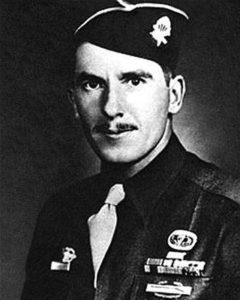 First Sergeant Leonard Alfred Funk Jr. was born on August 27, 1916. He joined the United States Army at Wilkinsburg, Pennsylvania in June 1941. The following year, the United States entered World War II and Funk volunteered to became a paratrooper. After training and earning his jump wings, he was assigned to the 508th Parachute Infantry Regiment stationed at Camp Blanding, Florida. Later, the regiment became part of the veteran 82nd Airborne Division.
First Sergeant Leonard Alfred Funk Jr. was born on August 27, 1916. He joined the United States Army at Wilkinsburg, Pennsylvania in June 1941. The following year, the United States entered World War II and Funk volunteered to became a paratrooper. After training and earning his jump wings, he was assigned to the 508th Parachute Infantry Regiment stationed at Camp Blanding, Florida. Later, the regiment became part of the veteran 82nd Airborne Division.
Funk jumped into Normandy with the 508th on D-Day, June 6, 1944. While serving with the 82nd Airborne Division, he became one of the most decorated soldiers of World War II. In addition to the Medal of Honor, he was awarded the Distinguished Service Cross, Silver Star, Bronze Star, and three Purple Hearts.
On January 29, 1945, First Sergeant Funk encountered a group of more than 80 escaped German soldiers and led in their recapture despite being grossly outnumbered. He, along with other soldiers that he had freed from the Germans, successfully killed or re-captured all of the German soldiers. For these actions, he was awarded the Medal of Honor on September 5, 1945 becoming the fifth member of the 82nd Airborne Division to receive the nation’s highest honor.
Funk was honorably discharged from the army in June 1945 and died on November 20, 1992.
Medal of Honor Citation for First Sergeant Leonard A Funk, Jr
He distinguished himself by gallant, intrepid actions against the enemy. After advancing 15 miles in a driving snowstorm, the American force prepared to attack through waist-deep drifts. The company executive officer became a casualty, and 1st Sgt. Funk immediately assumed his duties, forming headquarters soldiers into a combat unit for an assault in the face of direct artillery shelling and harassing fire from the right flank. Under his skillful and courageous leadership, this miscellaneous group and the 3d Platoon attacked 15 houses, cleared them, and took 30 prisoners without suffering a casualty.
The fierce drive of Company C quickly overran Holzheim, netting some 80 prisoners, who were placed under a 4-man guard, all that could be spared, while the rest of the understrength unit went about mopping up isolated points of resistance. An enemy patrol, by means of a ruse, succeeded in capturing the guards and freeing the prisoners, and had begun preparations to attack Company C from the rear when 1st Sgt. Funk walked around the building and into their midst. He was ordered to surrender by a German officer who pushed a machine pistol into his stomach.
Although overwhelmingly outnumbered and facing almost certain death, 1st Sgt. Funk, pretending to comply with the order, began slowly to unsling his submachine gun from his shoulder and then, with lightning motion, brought the muzzle into line and riddled the German officer. He turned upon the other Germans, firing and shouting to the other Americans to seize the enemy’s weapons. In the ensuing fight 21 Germans were killed, many wounded, and the remainder captured. 1st Sgt. Funk’s bold action and heroic disregard for his own safety were directly responsible for the recapture of a vastly superior enemy force, which, if allowed to remain free, could have taken the widespread units of Company C by surprise and endangered the entire attack plan.

Vietnam War – 82nd Airborne Medal of Honor Recipient
One award of the Medal of Honor was made to a member of the 82nd Airborne Division during World War I.
Felix M Conde-Falcon
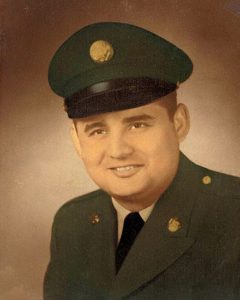 Félix Modesto Conde Falcón was born on February 28, 1938 in Juncos, Puerto Rico. He joined the United States Army in April of 1963 in Chicago, Illinois. After joining the Army and completed training, he was assigned to Delta Company, 1st Battalion, 505th Infantry, 3rd Brigade, 82nd Airborne Division. He was killed during combat operations in Ap Tan Hoa, South Vietnam, on April 4, 1969.
Félix Modesto Conde Falcón was born on February 28, 1938 in Juncos, Puerto Rico. He joined the United States Army in April of 1963 in Chicago, Illinois. After joining the Army and completed training, he was assigned to Delta Company, 1st Battalion, 505th Infantry, 3rd Brigade, 82nd Airborne Division. He was killed during combat operations in Ap Tan Hoa, South Vietnam, on April 4, 1969.
The award comes through the Defense Authorization Act called for a review of Jewish American and Hispanic American veterans from World War II, the Korean War and the Vietnam War to ensure that no prejudice was shown to those deserving the Medal of Honor. As a result, it was determined that Staff Sergeant Conde-Falcon was deserving of the nation’s highest honor. Subsequently, he was posthumously awarded the Medal of Honor by President Barack Obama in a March 18, 2014 ceremony in the White House making him the 6th and final member of the 82nd Airborne Division to receive the Medal of Honor.
Medal of Honor Citation for Staff Sergeant Felix M Conde-Falcon
For extraordinary heroism in connection with military operations involving conflict with an armed hostile force in the Republic of Vietnam, while serving with Company D, 1st Battalion, 505th Infantry, 3rd Brigade, 82nd Airborne Division:
Conde-Falcon distinguished himself by exceptionally valorous actions, April 4, 1969, while serving as platoon leader during a sweep operation in the vicinity of Ap Tan Hoa, Vietnam. Entering a heavily wooded section on the route of advance, the company encountered an extensive enemy bunker complex, later identified as a battalion command post. Following tactical artillery and air strikes on the heavily secured communist position, the platoon of Conde-Falcon was selected to assault and clear the bunker fortifications.
Moving out ahead of his platoon, he charged the first bunker, heaving grenades as he went. As the hostile fire increased, he crawled to the blind side of an entrenchment position, jumped to the roof, and tossed a lethal grenade into the bunker aperture. Without hesitating, he proceeded to two additional bunkers, both of which he destroyed in the same manner as the first. Rejoined with his platoon, he advanced about one hundred meters through the trees, only to come under intense hostile fire.
Selecting three men to accompany him, he maneuvered toward the enemy’s flank position. Carrying a machine-gun, he single-handedly assaulted the nearest fortification, killing the enemy inside before running out of ammunition. After returning to the three men with his empty weapon and taking up an M-16 rifle, he concentrated on the next bunker. Within ten meters of his goal, he was shot by an unseen assailant and soon died of his wounds.
His great courage, his ability to act appropriately and decisively in accomplishing his mission, his dedication to the welfare of his men mark him as an outstanding leader Conde-Falcon’s extraordinary heroism and devotion to duty, at the cost of his life, were in keeping with the highest traditions of the military service and reflect great credit upon himself, his unit, and the United States Army.

Summary
The 82nd Airborne Division, with its long and honorable history of service boasts six members that have received the most-prestigious personal military decoration in the land. All six of these soldiers distinguished themselves by acts of valor. The 6 awards of the Medal of Honor to 82nd Airborne Division soldiers were earned in three different wars; 1 (Pike) during World War I, 4 (York, Towle, Deglopper, and Funk) during World War II, and 1 (Conde-Falcon) during the Vietnam War. They were excellent examples of “All American” spirit and brought great credit to themselves, the 82nd Airborne Division and the United States Army.
